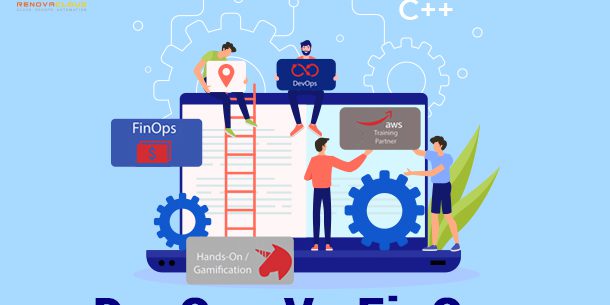
DevOps Vs FinOps: Together we stand, divided we fall

Samira Kabbour
CMO
Remember the good old days?
A new product is added to the roadmap, IT peeps are designing the labs and production environments, endless negotiations with procurement (“Yes, we really need 650X16GB RAM Memory cards!!”), escalate to a VP, maybe some begging, but finally, all the equipment arrives and it’s geek heaven down in the server room.

Who doesn’t miss unboxing servers and switches, popping bubble wrap, CAT 6 cables running around, and building RAIDS into the night?
Server life was so complex, yet so simple.
Fast forward a decade, cloud computing is on the rise, and it’s an era of unprecedented growth and agility for businesses worldwide. It’s a new era, alas, there’s a new villain.
“Cloud Waste” (cloud resources that are not fully utilized and are being paid for), a term that was considered insignificant with On-Prem data centers.
Cloud Cost Optimization – It’s for everyone
Gartner forecasts that due to lack of cost-optimization strategies in place, 80% of companies will overshoot their IaaS budget for 2020 and 45% of companies that are migrating to the cloud will overspend their budget by 70%, over the first 18 months.
Regardless of this forecast, monthly cloud bills have altered the IT budgeting system from CAPEX (Capital Expenditures) to OPEX (Operational Expenditures), forcing engineering leaders to act more consciously towards cloud spend, especially when it has a much higher impact on revenue and growth.
As more and more companies increase their SaaS offerings, introduce new products and features, the negative impact of the monthly cloud bill is expanding.
If once cloud management, cost optimization, and cloud governance were considered all buzz words, nowadays, it’s recognized as a must-have practice. It’s no surprise that a growing number of businesses are now realizing the necessity of having a trustee partner such as Renova cloud with a technical cloud expertise who is responsible for optimizing the organization’s cloud infrastructure.
DevOps – Jack of all trades with an unlimited credit card
It was just over 11 years ago that DevOps broke down the silos between development and operations, as SaaS platforms gained popularity.
New technologies and new infrastructures were introduced to provide faster, smarter, and more efficient ways to deploy new products at scale, revolutionizing the world of IT and R&D.
The DevOps journey in the cloud broke the traditional procurement processes and ‘IaaS at a click of a button’ quickly gained recognition as the “next big thing”.
DevOps engineers running workloads in the public cloud are like my 5-year-old nephew in a toy store, endless opportunities and capabilities. Without a cost-effective mindset, things can quickly turn into a billing nightmare.
With great power, comes great responsibility and DevOps engineers, as the main consumers of cloud infrastructure, have gradually been burdened with optimizing the monthly cloud bill.
It was only natural that the organization would appoint the “magicians”, that can literally make anything happen, with the continuous task of optimizing their workloads.
On one hand, scaling fast can cause over-provisioning and waste, but on the other hand, rightsizing too aggressively may impact performance.
For SMB’s, due to the relatively small scale, DevOps and engineering leaders are still trusted with Cloud Cost Optimization, even though the industry trend is to implement
FinOps strategies as a practice.
FinOps – An emerging practice
The financial challenges derived from the exponential growth of Cloud Computing are being tackled by a newly emerging practice, called FinOps (Financial Operations).
We’re breaking Silos again, and this time it’s between Finance and technical operations.
According to the FinOps Foundation, FinOps (Cloud Financial Management) is “The practice of bringing financial accountability to the variable spend model of the cloud, enabling distributed teams to make business trade-offs between speed, cost, and quality.”
Organizations increase the business value of running in the cloud by bringing together business, engineering, and financial professionals with a new set of disciplines.
The FinOps engineer is the organization’s trustee when it comes to cloud cost optimization.
His objective is to collaborate with engineering teams to predict, plan, and purchase cloud infrastructure, based on the product’s requirements.
FinOps teams are embedded within the technology group in order to understand the technical requirements of the product’s lifecycle (starting from the early design stage to large scale), and are trusted to continuously optimize the organization’s cloud infrastructure.
“With FinOps, accountability is redefined, and it empowers product teams
to manage their own usage with cloud against their own budget”
Michael Fuller, Founding member of The FinOps Foundation
Some are often mistaken that FinOps is all about saving money, but it’s way more than that.
A well-architected cloud budget drives more revenue, enables product enhancements,
performance, and feature release speed.
FinOps is still an emerging practice, but as we’ve seen the DevOps practice reach almost every niche of the Ecosystem, it is inevitable having a FinOps practitioner in every organization, as they scale and as more cloud services are consumed.
DevFinOps – The Dream team
“Hey you, don’t tell me there’s no hope at all, Together we stand, divided we fall”
Roger Waters, Pink Floyd
When it comes to having a broad and centralized solution for continuously planning and optimizing cloud infrastructure, nothing beats cross-team collaboration.
Once a new product is added to the roadmap, having DevOps and FinOps work together in synergy with proper planning and embedded processes towards a well-architected cloud can only benefit an organization, drive revenue sky high, and make everyone happy.
Some might argue that the intervention of financial stakeholders in the product lifecycle may even impact product performance, but just like every new process, we believe that proper implementation accompanied by trust and leadership will align everyone towards cloud serenity.
DevOps and FinOps do not compete but complete one another. Looking forward, it’s imperative that DevOps and FinOps will work together as a homogenous unit because operating as standalone silos will destine them to clash, and eventually fail.



